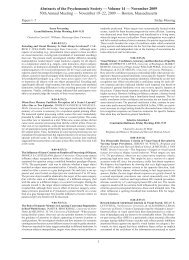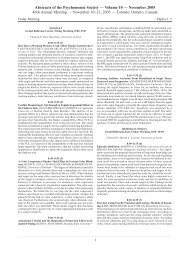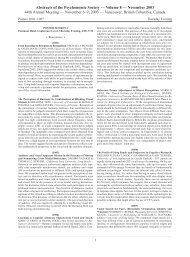S1 (FriAM 1-65) - The Psychonomic Society
S1 (FriAM 1-65) - The Psychonomic Society
S1 (FriAM 1-65) - The Psychonomic Society
Create successful ePaper yourself
Turn your PDF publications into a flip-book with our unique Google optimized e-Paper software.
Posters 3001–3009 Friday Evening<br />
POSTER SESSION III<br />
Grand Ballroom, Convention Center, Friday Evening, 5:30–7:00<br />
• METACOGNITION •<br />
(3001)<br />
What Age Differences? Feelings-of-Knowing Reflect an Illusion of<br />
Recognition for Both Younger and Older Adults. DEBORAH K.<br />
EAKIN, Mississippi State University, & CHRISTOPHER HERTZOG,<br />
Georgia Institute of Technology—We evaluated age differences in<br />
feeling-of-knowing judgments (FOKs) for targets, given cues varying<br />
in associative set size. Data from Eakin and Hertzog (2006) were used<br />
which produced cue-set-size effects for recall for both younger and<br />
older adults, but were eliminated (1) in the intralist cuing condition for<br />
younger adults and (2) in recognition for both cuing conditions for both<br />
age groups. FOKs evidenced illusions about predicted recognition that<br />
were driven by the pattern of recall outcomes. FOK sensitivity did not<br />
reflect the relatively high probability of recognition for unrecalled<br />
items under extralist cuing, nor did it track the cue-set-size reversal for<br />
intralist cuing. Moreover, FOK accuracy was near chance for both age<br />
groups, producing no reliable age differences in FOK accuracy.<br />
(3002)<br />
Knowing We Know Before We Know: EEG Correlates of Initial<br />
Feeling-of-Knowing. CHRISTOPHER A. PAYNTER, PAUL D. KIEF-<br />
FABER, & LYNNE M. REDER, Carnegie Mellon University (sponsored<br />
by Lynne M. Reder)—In a replication of Reder and Ritter (1992)<br />
that also collected EEG recordings, subjects performed a feeling-ofknowing<br />
task in which they had to rapidly determine whether the answer<br />
to a math problem was known or whether the answer had to be<br />
calculated. Previously unfamiliar math problems were repeatedly<br />
tested over the course of the experiment and the feeling of knowing<br />
or not-knowing judgment had to be completed in 850 msec (much less<br />
time than needed to retrieve the answer itself). ERP analyses uncovered<br />
waveform differences between accurate retrieve versus calculate<br />
trials as early as 200 msec following onset of the problem. Accurate<br />
retrieve trials showed activation primarily in the right hemisphere following<br />
problem onset, whereas calculate trials and inaccurate retrieve<br />
trials showed activation primarily in the left hemisphere. <strong>The</strong>oretical<br />
implications are discussed.<br />
(3004)<br />
<strong>The</strong> Influence of Framing on Children’s Metacognitive Judgments.<br />
BRIDGID FINN, Columbia University, & LISA K. SON, Barnard<br />
College—Recent evidence suggests that metacognition can be influenced<br />
by framing (Finn & Metcalfe, 2007; Koriat, Bjork, Sheffer, & Bar,<br />
2004). Judgments of learning (JOLs) show a diminished overconfidence<br />
bias (Finn & Metcalfe, 2007), and are sensitive to varying retention intervals<br />
(Koriat et al., 2004) when made within a forget frame rather than<br />
a remember frame. Thus far these results have been limited to adults. In<br />
this study, children studied synonym pairs and made JOLs within either<br />
a remember or a forget frame. <strong>The</strong>y then predicted their performance on<br />
a test coming up in either 10 min or in 1 week. <strong>The</strong> results showed that<br />
forget judgments were lower than remember judgments at both the<br />
10-min and 1-week prediction intervals. While remember judgments did<br />
not differentiate between the retention intervals, forget judgments were<br />
higher for the 10-min prediction than for the 1-week prediction.<br />
(3005)<br />
<strong>The</strong> Relationship Between Cue Diagnosticity and Judgment Accuracy<br />
for Judgments of Text Learning. JULIE M. C. BAKER &<br />
JOHN DUNLOSKY, Kent State University (sponsored by John Dunlosky)—One<br />
explanation for the poor predictive accuracy for judgments<br />
of text learning is that the cues that people use to make these<br />
judgments are not diagnostic; that is, the cues do not predict criterion<br />
test performance. We conducted an experiment to test the hypothesis<br />
that cue diagnosticity drives judgment accuracy. Cue diagnosticity<br />
was manipulated by varying the similarity between momentary ac-<br />
87<br />
cessibility and the criterion test. In particular, the criterion tests were<br />
either a multiple-choice recognition test or a speeded recall test—the<br />
latter most resembled the cue of momentary access. As expected, cue<br />
diagnosticity and judgment accuracy were higher for the speeded recall<br />
test than for the recognition test.<br />
(3006)<br />
Does Test Expectancy Influence Metacomprehension Accuracy?<br />
KEITH W. THIEDE, Boise State University, & JENNIFER WILEY<br />
& THOMAS T. GRIFFIN, University of Illinois, Chicago—In our previous<br />
research, we have improved metacomprehension accuracy by<br />
providing contexts that get readers focused on their situation model<br />
when judging comprehension. We have not, however, examined<br />
whether readers can achieve this focus on the situation model on their<br />
own, if informed via instructions and practice tests that that is what<br />
they should do. To evaluate this possibility, we conducted a study<br />
using the standard test-expectancy paradigm. <strong>The</strong> results showed that<br />
metacomprehension accuracy was influenced by test expectancy. Participants<br />
who expected an inference test more accurately monitored<br />
their performance on the inference tests than did the group that had<br />
expected a memory test (memory of details). <strong>The</strong>se findings confirm<br />
that readers can focus on the kind of test items that tap the situation<br />
model and improve metacomprehension accuracy, if they know what<br />
type of tests to expect.<br />
(3007)<br />
Metacognitive Control and Strategy Selection: Deciding to Practice<br />
Retrieval During Learning. JEFFREY D. KARPICKE, Purdue University<br />
(sponsored by David B. Pisoni)—Practicing retrieval is a potent<br />
technique for enhancing learning, but do students use retrieval<br />
practice when they regulate their learning on their own? Four experiments<br />
addressed this question. Subjects learned foreign language<br />
word pairs in a multitrial learning task, and long-term retention was<br />
assessed on a 1-week delayed test. When learning condition was experimentally<br />
manipulated by assigning pairs to be repeatedly tested,<br />
repeatedly studied, or removed from practice, repeated testing produced<br />
powerful effects on learning and retention. However, when subjects<br />
were given control over their own learning and could choose to<br />
test, study, or remove pairs, they chose to remove the majority of pairs<br />
rather than to practice retrieval, leading to poor retention. <strong>The</strong> experiments<br />
demonstrate an illusion that occurs during self-regulated learning:<br />
Fluent processing promotes confidence in one’s own learning and<br />
leads individuals to terminate practice rather than to self-test, a strategy<br />
choice that ultimately results in poor retention.<br />
• DISCOURSE PROCESSES •<br />
(3008)<br />
Memorial Influences on the Fluency of Text Processing. MATTHEW<br />
COLLINS & BETTY ANN LEVY, McMaster University—Numerous<br />
studies have shown that repeated reading of the same text leads to<br />
faster and more accurate reading. Known as the text repetition effect,<br />
this effect is attributable to a memory representation of the text recruited<br />
to facilitate processing upon rereading. However, there is a<br />
great deal of debate regarding the nature of the text memory representation.<br />
Recently, Raney (2003) has proposed a model suggesting<br />
that overlap at the three levels of text representation can account for<br />
processing fluency between passages. Consistent with this account,<br />
we found that the magnitude of the repetition effect decreased when<br />
there was less overlap between passages at the level of the situation<br />
model. <strong>The</strong>se results suggest that text representations cannot be described<br />
as either strictly abstract or strictly episodic. Rather, it appears<br />
that the degree of overlap at each level of representation will determine<br />
how much of a repetition benefit there is between passages.<br />
(3009)<br />
Amazing Stories: Does Fictionality Matter in Learning From Text?<br />
DANIEL SLATEN, DAVID N. RAPP, & WILLIAM S. HORTON,





